|
|
|
Sort Order |
|
|
|
Items / Page
|
|
|
|
|
|
|
| Srl | Item |
| 1 |
ID:
089056
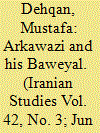

|
|
|
|
|
| Publication |
2009.
|
| Summary/Abstract |
The study of southern Kurdish literature is largely dominated by a bipolar perspective. Literature in southern Kurdistan is mostly, if not exclusively viewed in the context of relations between Iran on the one hand and, on the other, Iraq, the local states of the eighteenth and nineteenth centuries. To be sure, Iran acquired a dominant role in southern Kurdistan, yet it is also considered to have been the only dynamic factor in southern Kurdish dialect, while the Iraqi regions are supposed to have fulfilled an essentially passive one. This article presents the most well-known poem of Arkaw z?, a southern Kurdish poet from Pi tiku, an Iranian region of southern Kurdistan. It transcribes, translates, and glosses a Feyl elegiac text in which the poet describes the death of his son. Notwithstanding my dialectological purpose, the article may also provide some raw material for the historians.
|
|
|
|
|
|
|
|
|
|
|
|
|
|
|
|
| 2 |
ID:
089061
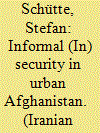

|
|
|
|
|
| Publication |
2009.
|
| Summary/Abstract |
Poverty and insecurity in Afghan cities are intricately intertwined with conditions of "informality." The term and the realities it describes refer to living situations in which basic needs and activities such as work, housing, and social security are unprotected by laws and standards. Immersion into such a convolution of informality determines the life of a majority among urban populations in Afghanistan and conveys a deep sense of insecurity for the urban poor. The paper looks at how rapid and unprecedented urban growth in Afghanistan goes along with rising levels of livelihood insecurity and explores how the urban poor cope with livelihood risks through a range of informal arrangements. Conceptually, the notion of "informal security regimes" helps capture informality as a coping strategy and how it relates to urban poverty in Afghanistan. Informed by extensive empirical fieldwork, the paper identifies different elements of the "informal security regime" in urban Afghanistan and explores their specific operations. The paper is mainly focused on the Afghan capital, Kabul, supplemented with evidence from other urban sites in Afghanistan.
|
|
|
|
|
|
|
|
|
|
|
|
|
|
|
|
| 3 |
ID:
089058
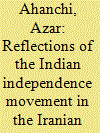

|
|
|
|
|
| Publication |
2009.
|
| Summary/Abstract |
After the Second World War and simultaneously with the independence movement in India many other movements for national independence and removal of colonial rule erupted in other Asian and African countries where news from India was of great importance and interest. This paper will focus on the coverage of India's independence movement by Iranian newspapers which were the main source of such news for the Iranians. The paper will examine a variety of Iranian newspapers across the political spectrum for the accuracy of their reports and the quality of their analysis of the developments in India. In spite of their technical shortcomings and their limited knowledge of India, the articles carried by the Iranian newspapers demonstrate the Iranian public's interest in India's movement for freedom from colonial rule, which they regarded as a source of hope and a model to be followed by other Asian countries suffering from foreign domination.
|
|
|
|
|
|
|
|
|
|
|
|
|
|
|
|
| 4 |
ID:
089051
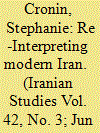

|
|
|
|
|
| Publication |
2009.
|
| Summary/Abstract |
For the nationalist elite of early Pahlavi Iran, the regime's military successes over tribal opposition, whether real or imagined, were welcomed and celebrated. These successes were interpreted as confirmation of their views of tribal power as hostile to modernity, archaic and outmoded, and of Riza Shah as the deliverer of Iran's national salvation. This conceptualization of the "tribal problem" had appeared in tandem with and as a product of modernist ideology in the late nineteenth century, acquired the backing of state power with the rise of the Pahlavi dynasty, and endured until the revolution of 1979. It communicated itself, in diluted form, to Western scholarship, which has been largely content to depict Riza Shah's tribal policies as regrettably brutal, but an unavoidable stage in Iran's progress and "modernization."
Yet this version of tribe-state relations is clearly an ideological construct rather than an historical analysis. The account which follows begins a re-evaluation of tribal politics in modern Iran, focusing especially on the Riza Shah decades when these politics were a site of intense conflict and where the nationalist template was most starkly delineated, and concludes by tracing and re-examining the evolution of the tribe-state dynamic in the decades of land reform and revolution.
|
|
|
|
|
|
|
|
|
|
|
|
|
|
|
|
| 5 |
ID:
089060
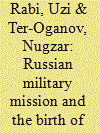

|
|
|
|
|
| Publication |
2009.
|
| Summary/Abstract |
Throughout the nineteenth century, the Qajar dynasty (1797-1925) of Iran engaged in a continuous process to build a regular army under the leadership and tutelage of professional European military missions. These continuous attempts at military reform and Europeanization reached a peak with the creation of the Persian Cossack Brigade (1879-1921) by the Russian military mission. This article focuses on the genesis of the Brigade and the Russian military mission, which followed some of the previously unsuccessful European military missions. The scholarly literature has paid little attention to the fitful beginnings of the Brigade. This article, however, deals with the early challenges faced by the Brigade during the period between 1879 and 1894, at the end of which it was on the verge of dissolution. The article tackles formative issues raised in under-explored Russian archival material and supplemented by Russian-language primary sources, as well as other relevant sources. It attempts to re-evaluate the origins of the Persian Cossack Brigade and provide a well-balanced portrait of the Brigade in light of the changing regional politics of the period.
|
|
|
|
|
|
|
|
|
|
|
|
|
|
|
|
| 6 |
ID:
089053


|
|
|
|
|
| Publication |
2009.
|
| Summary/Abstract |
After the bombardment of the Majlis in June of 1908, several Iranian constitutionalists were forced into exile-if not arrested and persecuted. An influential group of these constitutionalists continued the publication of the Persian paper Sur-i Israfil in exile, in Yverdon, Switzerland, explicitly opposing the monarch, Mohammad Ali Shah Qajar. This article examines the ways and means by which the exiled constitutionalists, in their writings, challenged the monarch and the previously indisputable office of monarchy, and how they proposed to re-define the institution of monarchy. Paradoxically, their marginal setting, writing from European exile, far away from the Iranian borders, did not preclude them from expressing views that were influential in shaping the modern political culture of Iran.
|
|
|
|
|
|
|
|
|
|
|
|
|
|
|
|
|
|
|
|
|